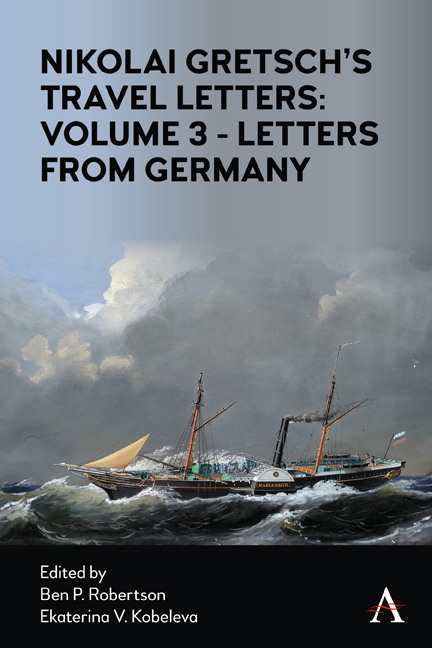Book contents
- Frontmatter
- Contents
- List of Illustrations
- Abbreviations
- Miscellaneous Frontmatter
- Introduction to Volume 3
- Letter XXXI
- Letter XXXII
- Letter XXXIII
- Letter XXXIV
- Letter XXXV
- Letter XXXVI
- Letter XXXVII
- Letter XXXVIII
- Letter XXXIX
- Letter XL
- Letter XLI
- Notes on this Translation
- Selected Bibliography
- Index
Letter XXXIX
Published online by Cambridge University Press: 22 October 2021
- Frontmatter
- Contents
- List of Illustrations
- Abbreviations
- Miscellaneous Frontmatter
- Introduction to Volume 3
- Letter XXXI
- Letter XXXII
- Letter XXXIII
- Letter XXXIV
- Letter XXXV
- Letter XXXVI
- Letter XXXVII
- Letter XXXVIII
- Letter XXXIX
- Letter XL
- Letter XLI
- Notes on this Translation
- Selected Bibliography
- Index
Summary
Conversations with Russians. Dinners. Kopitar. Balbi. Count Gozze. Doctor Carl. Interesting acquaintances at the theatre. D. P. Tatishchev. Vienna society. Prince Metternich.
Now it would be appropriate to describe the way of life in Vienna, sketch the different levels of the local society, castigate the aristocracy, as is customary in travel accounts. But I do not have an opportunity to do so. I have not been introduced in Vienna society, do not know either its broad or narrow circles; I am familiar only with the exterior part of Vienna. During the very first day of my stay in the capital of Austria, I went to the opera and found myself among my countrymen. In the first rows of the stalls, I found the secretaries of our embassy, K. A. Zherve and A. P. Adelung, my old acquaintance Y. N. Tolstoy, I. L. Golenishchev-Kutuzov, who came to Vienna as a diplomatic courier, A. A. Iskritsky, Prince Baryatinsky, and N. F. Remer, who are here to take the Austrian thermal waters. Plenty of acquaintances, plenty of guides: I was inseparable from them. Y. N. Tolstoy, on his way to Paris, was staying in apartments in the same corridor with me. I saw him in the mornings and spent evenings at tea in friendly conversation. We usually had dinner in one big, all-Russian company in the best hotel of the city, the White Swan (zum weissen Schwan) at the Neumarkt. Imagine a magnificent, tastefully decorated hall with up to twenty large and small round tables. At each table sits a special company. It is not difficult to distinguish the Russian table by the carefree, loud gaiety, by the exclusive use of the Russian language, which sounds inexpressibly dear in a foreign country, and by the abundant dessert. I will say here, to the point or not, that in Vienna, there are no common tables (tables d’hote), but people dine everywhere a la carte, choosing the dishes. This might not be exciting to someone who is not an inveterate gastronome. Moreover, in Austria, one is expected to be familiar with special restaurant terminology. Before my trip to Vienna, I thought that eingemachte Sachen meant jam from berries or fruit, but here, this expression refers to any dish served with a sauce. What is Uffieten? An appetizer served on platters (hors d’oeuvres): cheese, radishes, etc.
- Type
- Chapter
- Information
- Publisher: Anthem PressPrint publication year: 2021



